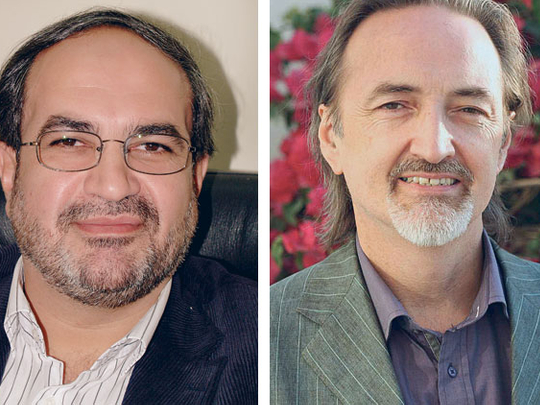
Dubai: Many people have heard the adage "lost in translation" — when a word or phrase makes sense in one language, but the sense is lost when translated into another language. Some people think that translation is easy, and use online translation software for their needs.
However, translation from Arabic to English and vice versa, is anything but easy. To start with, the Arabic language has more than twice as many words as English and a different grammatical structure.
This isn't the only obstacle to translation though, as experienced translator Denys Johnson-Davies told Gulf News recently: "It's not about translating words, it's about translating a whole culture."
Cultural differences and variations make translation between these two languages that much more difficult.
Adel Salem Bahameed, PhD, wrote in "Hindrances in Arabic-English Intercultural Translation" (published in the January 2008 issue of Translation Journal) that: "Language reflects the interests, ideas, customs and other cultural aspects of a community.
"The vocabulary of a language manifests the culturally important areas of a group of people in a particular setting, whether religious, aesthetic, social and environmental, among others," (citing linguistic scholars Ito and Nakakoji, 1996).
For instance, he continued, Arabic has a variety of names for camels, dates, swords, horses, rain etc. while English has linguistic signs associated with the sea.
This is because a majority of English-speaking peoples are exposed to the sea as part of their environment.
One example of a cultural connotation that poses a problem in Arabic-English translation is the word "owl".
Double meaning
While in English the bird is associated with wisdom and grace, in Arabic it is a symbol of pessimism and has negative associations, Bahameed wrote in the article.
So how can these cultural differences be overcome when translating? For Ahmad Mardini, General Manager, Elaph Translation, the translator's skill is paramount.
"You have to have a very high education, wide mind. You have to be familiar with politics, economics and everything about life," he told Gulf News from his Shaikh Zayed Road office.
"You have to use your spirit, your emotion, your mind, your culture, your context. Whatever you have, you have to utilize," he said. Mardini used the example of translating politician's words, which are sometimes "hollow".
"You have to be able to understand everything, you have to know what the politician is thinking, you have to also translate his spirit, his soul.
"You not only have to make a literal translation, you have to be creative, innovative," he said.
Mardini himself has 20 years experience as a translator, and five years ago set up his translation business.
He is now looking to expand into instant translation as part of the business that employs 30 translators.
It's not just translating difficult political speech that poses a problem, but also translating for children.
Andy Smart translated the children's book "The Gruffalo" with his wife Nadia Fouda. "Al Gharfool" has kept its rhyme in Arabic. So how difficult was it to translate?
Being faithful
"The main challenge is the same that any translator faces, which is how to remain faithful to the language and spirit of the original text while creating a text that has its own life and should have its own merits regardless of the original text," Smart told Gulf News.
"Al Gharfool" was highlighted recently at the Emirates Literature Festival, held earlier this year.
"Translating into Arabic for young children has an extra challenge because of the differences between written and spoken Arabic. Young children who are not yet able to read confidently in Arabic have to make a real effort to appreciate the written form," he said.
Relevance: Discovering cultures through translations
Transliteration — translating literally what the text says — raises problems when different cultures are involved.
For example, translating the phrase "as white as snow" would have no meaning for a culture with no experience of snow, or no connection with the form of weather.
In this case, Bahameed wrote, the sentence would be translated as something more relevant, for example "as white as cotton". Other words were adapted for young Arabic-speaking readers.
Therefore, the phrase "translate word for word" loses its own meaning, and perhaps should be adapted to "translate culture to culture".










